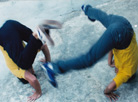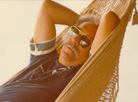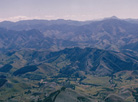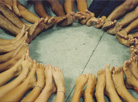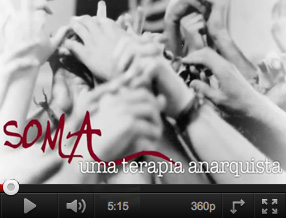On Soma
Soma is a therapeutic-pedagogical approach based on the permanent relationship between the individual behavior and the ways in which we socialize. It stems from a unique combination of contemporary theories and practices from a range of knowledge fields, particularly psychology, sociology and philosophy. This uniqueness is reflected in the transdisciplinary epistemology of Soma and its evolving dynamics.
A libertarian therapy, Soma views human behavior from the everyday perspective of human relations and interactions. Power games, which underlie our social micro-relations, are seen as being atthe root of social authoritarianism – which in turn engenders capitalistic values such as propriety, competition, profit and exploitation. These should not be treated only in terms of ideology and market, as they undoubtedly influence vital areas of human relations. For Soma therefore, politics begins in everyday, micro-social situations and directly affects our emotional functioning.
Rationality alonecannot account for the immense cobweb of socially imposed controls and their impact on individuality. This is the great paradox: how to escape from hierarchical, authoritarian relationships in which feelings and other emotional extensions of relationships are contaminated by something which cannot be reached just through ideas and thought. Even if one believes oneself to have a personal libertarian vision of the world, this may not be reflected in one’s behavior in love, familial and affective relationships. It seems to be easier to be ‘free’ or ‘revolutionary’ away from home, from privacy and exiled in one’s own body.
This line of questioning led to the creation of Soma early in the 70’s. Originally a psychoanalyst, Roberto Freire was also a militant fightingthe military dictatorship. He realized he would not find in either traditional psychology or psychoanalysisthe tools to deal with the emotional and psychological conflicts of the fellow militants who sought him for help. He decided to research the work of a scientist disowned by the academia, the most radical dissident of psychoanalysis – Wilhelm Reich, and from this point, Freire created Soma, a body group therapeutic approach structured on the basis of one’s life in society.
On the social laboratories of the Soma groups, we attempt to create an awareness towards our everyday authoritarian power practices, and how these affect others and affect us. The self-managed group dynamics contribute towards the construction of the therapeutic process, which is not at all detached from living ethically and politically. Thus, group therapy creates a space for self-understanding , and the each other participant becomes a sort of social mirror, reflecting our own behavior.
Soma aims at addressing questions such as: how do we build a liberating subjectivity? How can ethics and autonomy reconcile? How do we establish a sociability based on the respect for individual differences? What role does our body play in constructing intersubjectivity ?
Methodology
The therapy has a fixed time limit (about a year and a half), in order to avoid constructing a relationship of dependence between the client and the therapist. It takes place within four three-hour sessions per month in experiences with physical exercises or group dynamic exercises. These exercises act upon a range of human behaviors, such as aggression, creativity, communication and sensoriality. They comprise games, plays, and dancing movements which serve both bioenergetics functions, such as creating an awareness of our behavior in our daily lives,and at the same time raises fundamental questionsabout our surrounding reality.
After each experience, the group participates in the ‘reading’ of the session, attempting to verbalize the sensations and perceptions produced by the exercise. The reading can be about oneself or about any other member of the group and it is from this stage of the process that the participant begins to produce his or her own therapeutic autonomy, developing a greater vision and understanding of attitudes and political behavior in everyday situations. At the ‘closure’ of the session, the therapist attempts to synthesize the discoveries made by the group, within the libertarian view of Soma.
The 4 monthly sessions, scheduled according to a group consensus, include field trips, particularly to regions where nature is still preserved (e.g. Visconde de Mauá – RJ). In these field trips we take advantage of a close proximity with nature through activities which include tracking, walking, rafting. This is an important stage for group dynamics, as it offers the chance to evaluate group self-management and collaborative work
As the end of the group approaches, when more than forty activities have been performed, we complete the therapeutic process of each member with a 3 –hour ´hot-chair´ individual session, in which he/she elaborates on and synthetizes his/her experiences throughout the group process. This is the most important stage of Soma, where a maximum of understanding of the therapeutic process is reached. Everyone occupies the ´hot-chair’ at this point, including the therapist.
Through this unique approach, Soma engenders a space of liberty, the search for autonomy, and the building of a reflexive/sensorial capacity to see ourselves in our experience with others on our everyday lives. The theoretical grounds married with the political environment of a dictatorship in forging the creation of a truly libertarian and unique therapeutic approach.
Background
Soma was born at a critical period in the recent history of Brazil, against a background of a military dictatorship established in 1964. The youngsters who fought the oppressive regime felt that the therapies then available could not address the emotional and psychological imbalances brought about by the repression undertaken by a bourgeois society, which lent support to the dictatorship and fascist politicians. Fear was so widespread that parents would denounce their own children and friends and love partners would turn against each other and do likewise. In this minefield scenario, Soma came to life, grounded on a multiplicity of intertwined experiences and studies – the fight against the dictatorship, the experiments of Roberto Freire in theater, the work of Wilhelm Reich, the Gestalt theory and the contributions of the Antipsychiatry movement – coupled with an anarchist worldview.
Soma was born out of research about the blocking of creativity, undertaken in the Centro de EstudosMacunaíma, São Paulo. Through drama exercises and games designed either for fun or for raising sensual awareness, Roberto Freire devised a series of therapeutic experiences which led to a rich discovery in the field of behavior and the infinite and unique differences therein. The understanding of how the body responds to everyday situations (which may require, e.g., aggression, communication or sensuality) allows us to value what differentiates us as individuals. This is essential in order to create new and original ways of behaving in lieu of the mass production of inert individuals engendered by the bourgeois society.
Even after the end of the military dictatorship and the advent of democracy in Brazil, we still live in world increasingly characterized by subtle and sophisticated control mechanisms. The explicit authoritarian control of the past has been replaced by less obvious but more complex and perverse mechanisms for effacing singularities. Soma fights this dangerous process by adopting sound theoretical contributions which are linked to socio-political analysis of today’s society, developing resistance and empowerment to value our uniqueness as individuals.
